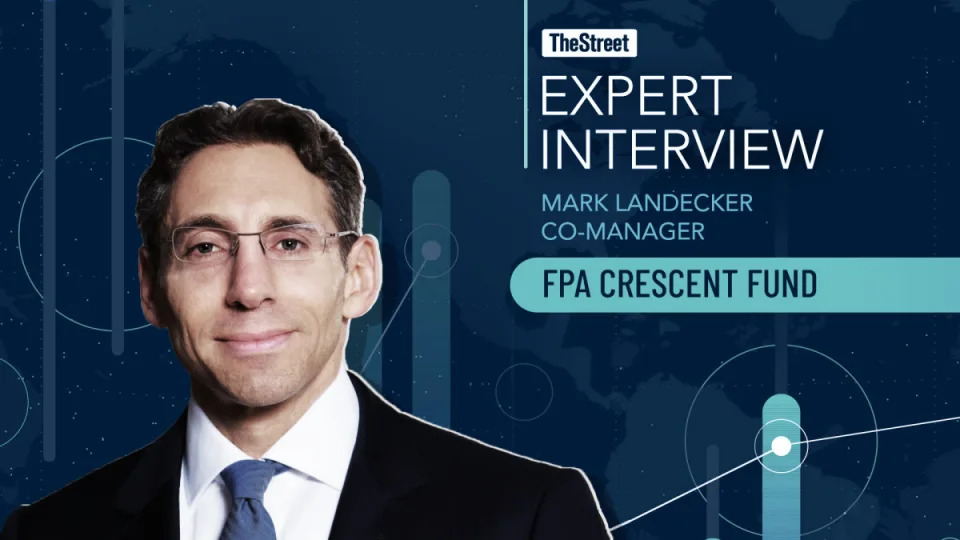$10 billion fund manager cites three favorite stocks
As an investor, you’re free to invest in almost anything, anywhere, at any time. So, perhaps you should consider mutual funds that utilize this strategy.
One is FPA Crescent ( FPACX ) , with $10.4 billion in assets. It has generated annualized returns of 14.35% over the past 12 months, 6.75% over three years, 9.51% over five years, and 7.41% over 10 years, according to Morningstar.
The fund beats the US Moderately Aggressive Target Allocation Index for three and five years but trails it for one and 10 years. Despite the index’s name, it seeks 77.5% exposure to global equity markets.

FPA/The Street
FPA Crescent investment strategy and stocks
FPA Crescent has a contrarian bent, looking for securities trading below what it sees as their intrinsic value. This can include large-cap stocks, small-cap stocks, foreign stocks, and high-yield bonds. The fund’s managers aren’t afraid to keep money in cash.
We recently spoke to fund co-manager Mark Landecker as part of our Expert Interviews series.
He spoke about the fund’s philosophy and several of its stock picks.
He and his colleagues like the consumer products industry, mid-cap stocks, and foreign stocks now.
Here are his comments.
TheStreet.com: What’s your investment philosophy?
Landecker: We look for absolute value. That’s been a rare breed over the last 15 years because the market has mostly gone straight up. But that’s not always the case.
We focus on winning by not losing. That often means holding cash. We don’t want an inexpensive security unless it’s trading at a discount to its intrinsic value.
We’ll invest in large-cap, small-cap, international stocks, and high-yield bonds. We have a significant degree of freedom and safety – more flexibility than some other managers.
Our average holding period for stocks is five years, and there are names we’ve held for more than a decade.
Related: Single Best Trade: Veteran fund manager picks Crown Castle stock
TheStreet.com: What’s the appeal of investing in anything, anywhere, anytime?
Landecker: We want to compound our capital at equity-like returns without exposure to permanent losses of capital.
We’re contrarian: we zig when others zag. There are multiple parts of the market we can avoid if there’s a risk of permanent loss. If large-caps are expensive, we can buy small caps and vice versa. If stocks and bonds are priced for perfection, we can build cash and wait for opportunities.
TheStreet.com: What are some of your favorite industries and market themes?
Landecker: Consumer-product stocks were very popular a few years ago, with price-earnings ratios of 20 or higher amid zero interest rates.
They are well-known brands but didn’t justify the elevated multiples. So we had little exposure. Now, the stocks have fallen, and interest rates are up. Valuations are attractive.
We like mid-cap stocks (below $10 billion) in the U.S. and abroad. Valuations are attractive. They have had trouble attracting attention because of the focus on mega-cap stocks.
We have some exposure to mega-cap tech and semiconductors but have lightened it due to valuations.
There are bargains in international markets, with lower valuations for companies than their U.S. analogs.
In terms of geography, most of our investments are in countries that embrace the rule of law and free markets. We have only small investments in China because they are moving away from free markets to a centrally-planned economy.
Related: Goldman Sachs offers 3 high-conviction stock picks
TheStreet.com: Can you discuss three of your favorite stocks?
Landecker:
1. Heineken ( HKHHY ) , the beer company. It’s No. 1 or No. 2 in 70 markets and gets half of its revenue from emerging markets.
We like the beer industry. It has the personality of a consumer staple with the brute force of scaled manufacturing and logistics.
In major markets, there’s consolidation into oligopolies with little exposure to private label. No one wants to bring a private-label beer to a party. So, brands will do well for many years. Heineken should have low-to-mid-single-digit annual revenue increases over the foreseeable future.
2. CarMax ( KMX ) , the country’s largest independent used vehicle dealer. CarMax has built a strong brand focused on providing the best user experience for buying a used car.
The company uses data from its millions of vehicles purchased and sold to understand the right price to buy and sell used vehicles. So, it has consistently generated an industry-leading gross profit per unit for more than a decade.
The recent downturn in used vehicle sales hurt CarMax’s sales volumes and market share. But we believe its investments in improving customer experience will result in increased sales and market share gains.
More Expert Interviews:
3. Vail Resorts ( MTN ) owns and operates 42 global mountain resorts and regional ski areas. That includes the top four North American resorts by skier visits.
We believe the company owns irreplaceable, scarce assets. The supply of quality resorts is fixed, giving Vail a quasi-monopoly/duopoly position in most of its markets.
Vail has been an industry pioneer in creating its Epic ski pass. The integration of its resorts on one pass increases the value of its network and serves as a competitive differentiator.
We think the business can grow earnings by high single digits over time.
Related: Veteran fund manager sees world of pain coming for stocks

